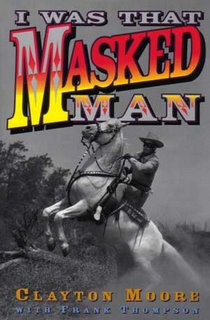Who Is that Masked Man?

When you enter comments on my blog you probably will be identified only as “anonymous blogger.” Today I received two comments from an old friend, Tim Boychuk, to whom I could not reply because the anonymity guaranteed him privacy, though I can’t imagine why he wanted it. It set me thinking about the circumstances under which people choose anonymity as opposed to fame. I can only speculate here about the motives that may be at work.
Generally I prefer publicity. Presumably everyone who keeps a blog must have a streak of showmanship or we wouldn’t do it. I wish everyone would read my blog. I don’t fear being recognized by strangers. If anything, I crave it. (Kilroy was here.) I am ready to stand up and express my opinions, even under somewhat risky circumstances. There are people who inherit a gene called the Dopamine Receptor D4, whose sympathetic nervous systems are not very responsive to danger. They actually crave risky situations and require more danger than the rest of us to get the adrenaline rush to which they are addicted. I know a few such people but I am definitely not one of them. They like horror movies, bungee jumping, and even warfare. (Not all of them will acknowledge liking war, but some do. The war correspondent Chris Hedges admitted it in his book, War is a Force That Gives Us Meaning.)
Me, I am a coward about physical danger. I can’t even climb on stepladder to fix a curtain rod. But I get proud of myself when I have to stick my neck out and stake my reputation on an opinion that goes against the group consensus. Mind you, this is a relative matter. I am not socially reckless, but I am at least twenty percent bolder than the average 74-year-old Torontonian. I predict that scientists will identify another gene that explains my preferred type of risk-taking.
We live in a society where, in some ways, technology is enabling others to find out more about who we are and what we have done. Google yourself and you’ll see that you have quite a history. Some people hate this fact; my friend Harriet sometimes avoids using credit cards because she dislikes having her profile defined so people will be able to tailor advertising to her particular pattern of consumption. I myself don’t mind that but, yes, there are a few facts that I wouldn’t want advertised. The desire for privacy is probably the desire to control what information about oneself gets spread around. But it can’t be controlled – at least with anything short of a lawsuit on grounds of slander.
In general, having a reputation is a good thing. We go through life scattering bread crumbs behind us, like Hansel and Gretel, so we know where we have been. And others can track us down by following our trail. One of the most interesting recommendations for social change that I’ve encountered lately is Hassan Masum’s work on what he calls “the reputation society.” It does offer a solution to the glut of information that we all receive every day. Instead of trying to read everything in your in-box, Masum proposes a way of filtering it by having it read and recommended by people whose judgment can be trusted. Slashdot uses that system by picking astute moderators on the basis of the quality of their previous posts. One’s own reputation establishes one’s right to pass judgment on others. That’s the way life works, really – except that we can sometimes manage our own reputations too much by invoking anonymity.
Anonymity may also characterize a collective life in which the individual personality is supposed not to count for much. For example, soldiers must wear uniforms, so that even their own wives may not identify them as they march past in unison. This is intended to suppress personal uniqueness so that they become more obedient. Likewise, in the old days, nuns wore identical habits and could not even reveal their hair, which was identifiable. I once taught in a Catholic women’s college and was often embarrassed because I could not tell the sisters apart – even those with whom I had talked on several occasions.
Criminals always want anonymity. To succeed in their work, they may even wear masks. But sometimes honest people also prefer not to be identified, for understandable reasons. This is especially true in an oppressive regime where one can be punished for unpopular opinions. Thus in the Soviet Union the finest literature was circulated secretly as samizdat.”
Honorable people may also prefer anonymity for less understandable reasons. Authors occasionally publish under pen names or as simply “by Anonymous” even when they expect the book to be well received. For example, the Federalist Papers were published in the name of “Publius,” but were written by Alexander Hamilton, James Madison, and John Jay.
Some philanthropists also prefer to be listed as “anonymous donors,” for reasons that everyone must admire, even when we do not emulate them. Generosity seems more authentic when it is clearly given without expectation of reward or public recognition. The Lone Ranger and Batman kept their identities secret, presumably to retain the necessary freedom to carry on their heroic public service.
So, you fine people who comment on my blog are welcome to retain your privacy, whatever your reasons may be. John and Jane Doe — whoever you may be — thanks for engaging in conversation with me and with my other readers.



1 Comments:
My apologies, Metta! I sent you an email last night, or I thought I had! I'll resend it.
Post a Comment
<< Home